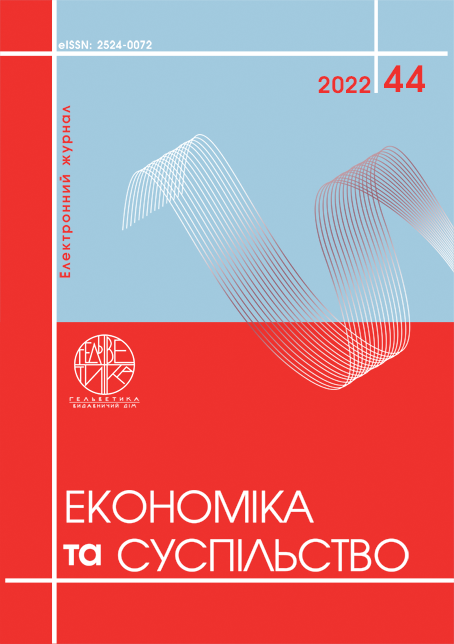THE ANALYSIS OF PECULIARITIES OF CAUSALITY IN THE SYSTEM «ENVIRONMENTAL TAXES – SHADOW ECONOMY»
Abstract
The article is devoted to the study of the existing influence of the shadow economy on environmental taxation and the question of the relationship between indicators. The amounts of revenues from environmental taxes in various countries of the European Union during 1994-2015 were analyzed, as well as the percentage indicators of the shadow sector in the same countries from 1994 to 2015. The dependence of the level of shadowing of the economy and the level of receipts of environmental taxes and fees was investigated using the Granger causality test. It was determined that in different countries there are specific connections between environmental taxation and the shadowing of the economy. It has been established that for many of the studied countries the shadowing of the economy is a primary phenomenon, and its reasons lie not only in tax factors, but also in the general desire to avoid responsibility for one's own activities. It has been determined that if the amount of the environmental tax or fee increases, the share of shading also increases by a certain percentage. It was noted that the number of informal organizations that carry out activities that lead to environmental pollution is currently increasing, and with this, undetected damage in the shadow sector is increasing. Analyzing scientific articles related to environmental security and cover-up activities, it was determined that the number of unofficial organizations that conduct activities that lead to environmental pollution is currently increasing, and with this, undetected harm in the shadow sector is increasing. We note that revenues from environmental taxes are influenced not only by the subjective motives of taxpayers regarding the legality of conducting their activities or reducing the volumes of declared indicators, but also by the scale of the actual functioning of the national economy. That is why calculations were made of the cause-and-effect relationships arising between the level of shadowing of the economy and the level of environmental taxation in relation to the country's GDP. It was found that in most of the countries the dependence was confirmed with a level of statistical significance of 99%. Therefore, we note that the results of the indicators prove the hypothesis: the reason for the shadow economy is a sufficiently high level of environmental taxes.
References
Бойко В., Ярова І. Інтелектуальний розвиток людства в сучасних умовах: економіка, історія. Монографія. Одеса : Купрієнко СВ, 2021. Кн. 19, Ч. 2. 134 с. URL: https://essuir.sumdu.edu.ua/bitstream-download/123456789/87975/1/Yarova_taxes.pdf.
Кондратюк В., Цимбалюк І. Проблематика екологічного оподаткування в Україні. Екологія, природокористування та охорона навколишнього середовища: прикладні аспекти : Зб. матеріалів Всеукр. науково-практ. заоч. конф. студентів, аспірантів та молодих уч., м. Маріуполь, 29 трав. 2020 р. URL: http://mdu.in.ua/Nauch/Konf/2020/zbirnik_ekologija_2020.pdf#page=110
Кубатко В. Державна політика детінізації економіки України з урахуванням економіко-екологічних факторів : дис. на здобуття наукового ступеня кандидата економічних наук. Суми, 2019. 221 с.
Ярошевич Н., Кондрат І. Ефективність системи екологічного оподаткування в Україні. Актуальні проблеми та перспективи розвитку обліку, аналізу та контролю в соціально-орієнтованій системі управління підприємством : Матеріали IV Всеукр. науково-практ. інтернет-конф., м. Полтава, 21 січ. 2022 р. URL: http://dspace.wunu.edu.ua/bitstream/316497/45153/1/Матерiали_конференцii_ПДАА_ Ч.1.pdf#page=380.
Chen H., Yu H., Jingwei L. The impact of environmental regulation, shadow economy, and corruption on environmental quality: Theory and empirical evidence from China. Journal of Cleaner Production. 2018. Vol. 195. URL: https://www.sciencedirect.com/science/article/abs/pii/S0959652618315531. (date of access: 29.11.2022).
Shadow economy by country, around the world. TheGlobalEconomy.com. URL: https://www.theglobaleconomy.com/rankings/shadow_economy/ (date of access: 29.11.2022).
Boiko V., Yarova I. (2021). Intelektualnyi rozvytok liudstva v suchasnykh umovakh [Intellectual development of human in current conditions]. Monographiya [a monograph]. Odesa: Kupriienko SV. 134 p. Available at: https://essuir.sumdu.edu.ua/bitstream-download/123456789/87975/1/Yarova_taxes.pdf (in Ukrainian)
Kondratyuk V., Tsymbalyuk I. (2020). Problematyka ekolohichnogo opodatkuvannia v Ukraini [Problems of environmental taxation in Ukraine]. Proceedings of the conference Ecologiia pryrodokorystuvannia ta ohorona navkolyshniogo seredovyshcha: prykladni aspekty. Available at: http://mdu.in.ua/Nauch/Konf/2020/zbirnik_ekologija_2020.pdf#page=110 (in Ukrainian)
Kubatko V. (2019). Derzhavna polityka detinizatsii ekonomiky Ukrainy z urakhuvanniam ekonomiko-ekologichnykh faktoriv [State policy of Ukrainian economy de-shadowing considering economy-ecological factors]. Dysertatsiya na zdobuttya naukovogo stupenia k.e.n. [PhD thesis]. Sumy. 221 p. (in Ukrainian)
Yaroshevych N., Kodrat I. (2022). Efektyvnist systemy ekologichnogo opodatkuvannia v Ukraini [Efficiency of environmental tax system in Ukraine]. Proceedings of the conference Aktualni problem ta perspektyvy rozvytku obliku, analizu ta kontroliu v sotsialno-oriientovasniy systemi upravlinnia podpryiemstvom. Available at: http://dspace.wunu.edu.ua/bitstream/316497/45153/1/Матерiали_конференцii_ПДАА_ Ч.1.pdf#page=380. (in Ukrainian)
Chen H., Yu H., Jingwei L. The impact of environmental regulation, shadow economy, and corruption on environmental quality: Theory and empirical evidence from China. Journal of Cleaner Production. 2018. Vol. 195. Available at: https://www.sciencedirect.com/science/article/abs/pii/S0959652618315531. (accessed: November 24, 2022).
Shadow economy by country, around the world. TheGlobalEconomy.com. Available at: https://www.theglobaleconomy.com/rankings/shadow_economy/ (accessed: November 24, 2022).


